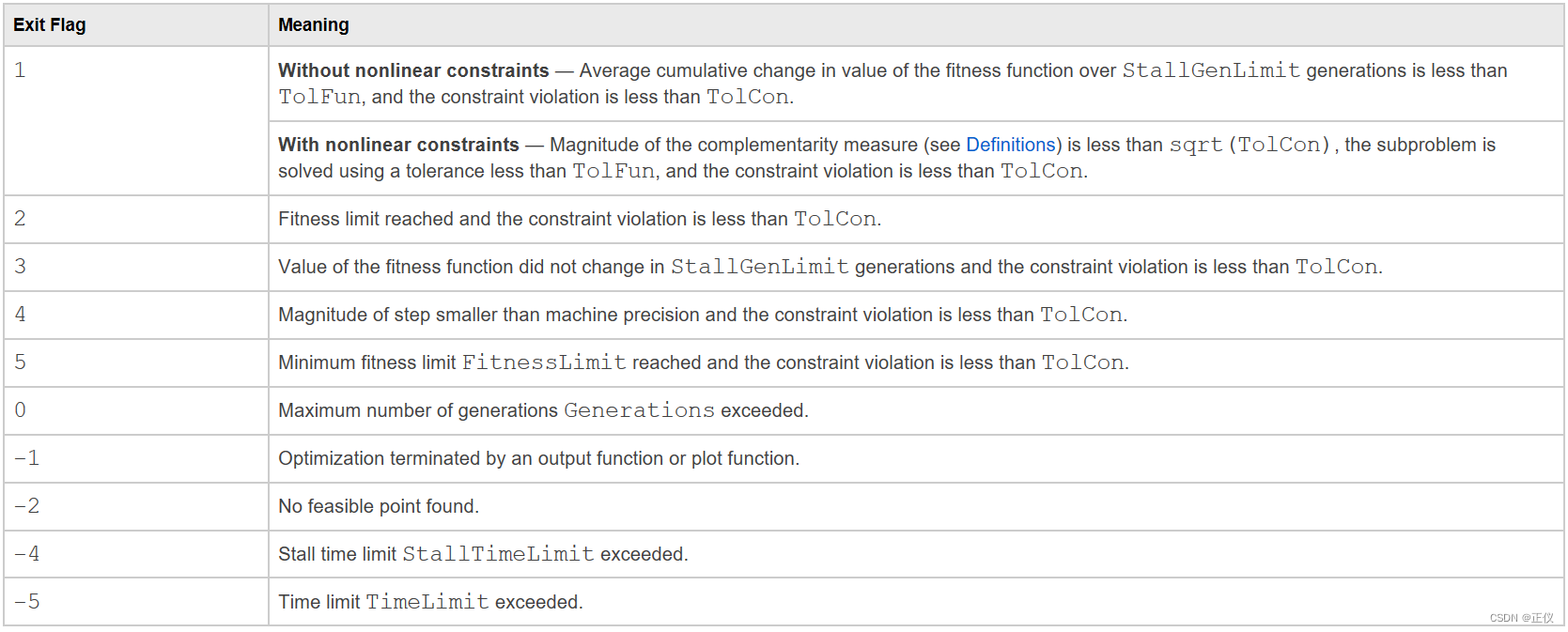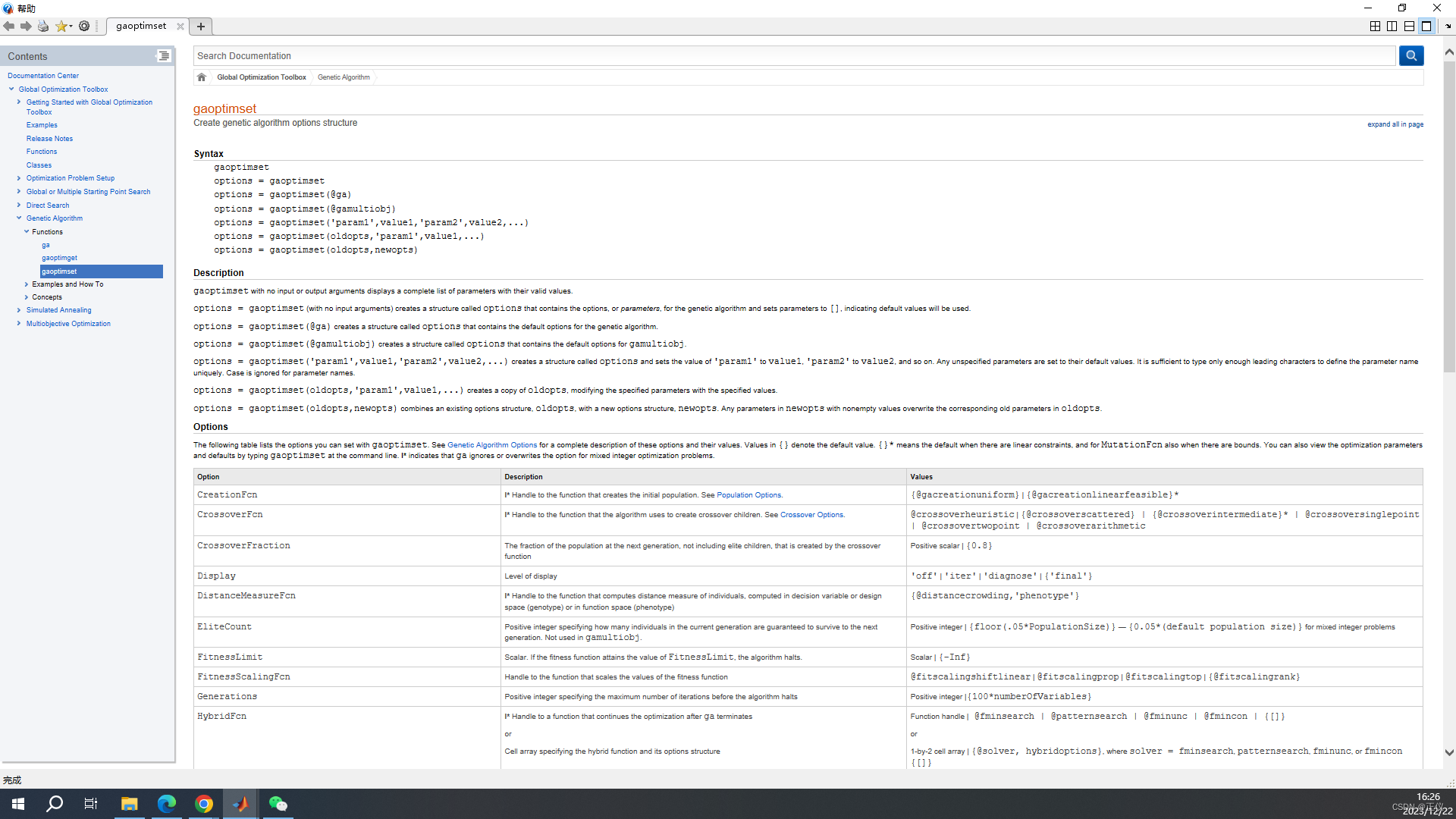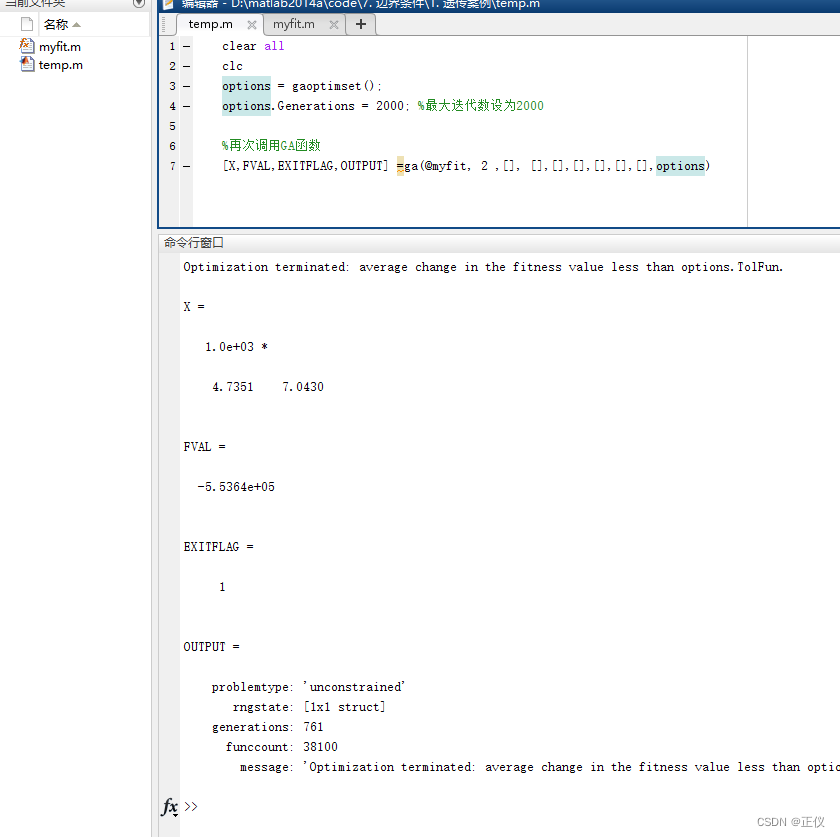MATLAB ga函数的使用方法
一、ga句法结构
x = ga(fitnessfcn,nvars)
x = ga(fitnessfcn,nvars,A,b)
x = ga(fitnessfcn,nvars,A,b,Aeq,beq)
x = ga(fitnessfcn,nvars,A,b,Aeq,beg,IB,UB)
x = ga(fitnessfcn,nvars,A,b,Aeq,beq,LB,UB,nonlcon)
x = ga(fitnessfcn,nvars,A,b,Aeq,beq,LB,UB,nonlcon,options)
x = ga(fitnessfcn,nvars,A,b,[],[],LB,UB,nonlcon,IntCon)
x = ga(fitnessfcn,nvars,A,b,[],[],LB,UB,nonlcon,IntCon,options)
x = ga(problem)
[x,fval] = ga(fitnessfcn,nvars,...)
[x,fval,exitflag] = ga (fitnessfcn,nvars,...)
[x,fval,exitflag,output] = ga(fitnessfcn,nvars,...)
[x,fval,exitflag,output,population] = gafitnessfcn,nvars,...)
[x,fval,exitflag,output,population,scores] = ga(fitnessfcn,nvars,...)
二、释义及解读
- fitnessfcn 为适应度句柄函数(即:目标函数);
- nvars 为目标函数自变量的个数;
- options 为算法的属性设置,该属性是通过函数gaoptimset赋予的;
- x 为经过遗传进化以后自变量最佳染色体返回值;
- fval 为最佳染色体的适应度;
- exitflag 为算法停止的原因;

-
output 为输出的算法结构;
-
population 为最终得到种群适应度的列向量(即当前群体,而群体里性能最好的个体,便是最优值点);
-
scores 为最终得到的种群(即:最优值点的目标函数取值);
-
A A A 与 b b b:线性不等式约束 A ? x ≤ b A*x\leq b A?x≤b 中的矩阵;
(Note: If the problem has m linear inequality constraints and nvars variables. then A is a matrix of size m-by-nvars and b is a vector of length m. ga evaluates the matrix product A*x as if x is transposed (Ax’). ) -
A e q Aeq Aeq 与 b e q beq beq:线性等式约束 A e q ? x = b e q Aeq*x=beq Aeq?x=beq 中的矩阵;
(Note: ga does not enforce linear constraints to be satisfied when the PopulationType option is ‘bitstring’ or ‘custom’.) -
nonlcon:非线性约束约束,该函数返回两个输出,即:[c,ceq] = nonlcon(x) 。 需要注意:ga atempts to achieve c = 0 c = 0 c=0 and c e q = 0 ceq = 0 ceq=0. c c c and ceg are row vectors when there are multiple constraints. Set unused outputs to [ ].
-
IntCon:若变量 x 中存在整数变量,则在这里设置!具体地,IntCon 是由正数整数组成的向量,取值从 1 到 nvars,IntCon 中的每个值代表决策变量 x 中相应位置的索引变量是整数变量。
(Note: When IntCon is nonempty, Aeq and beq must be empty ([ ]), and nonlcon must return empty for ceq. For more information on integer programming, see Mixed Integer Optimizaton.) -
options:Create options using gaoptimset. 下一章节将详细介绍 options 中关于 gaoptimset 的设置规则。
三、gaoptimset 介绍
gaoptimset 常用来设置 options 中的各个选项,其句式结构如下:
options = gaoptimset('param1',value1,'param2',value2,...)
其中, ‘Param1’、 ‘Param2’等是需要设定的参数,比如:种群规模(PopulationSize)、交叉比例(CrossoverFraction)等,value1、value2等则是Param的具体值,常用的参数名如下表:
| 设定的参数名(Param名) | 说明 | 默认值 |
|---|---|---|
| CrossoverFraction | 交叉比例 | 0.8 |
| Generations | 算法中止的最大迭代次数 | 100 |
| PopulationSize | 种群规模 | 20 |
| MigrationFraction | 变异概率 | 0.2 |
| FitnessLimit | 当适应度函数达到设定的值时算法中止 | - |
| StallGenLimit | 当超过StallGenLimit代适应度函数为改善时,算法中止 | 50 |
更多参数设定详见 MATLAB 官方文档,可在MATLAB命令窗口中输入 “doc gaoptimset” 查看:

四、实例运行
实例原始网址: MATLAB利用遗传算法函数求目标函数的最优解
- 目标函数如下:
function f = myfit( x )
f = (339-0.01*x(1)-0.003*x(2))*x(1)...
+ (399-0.004*x(1)-0.01*x(2))*x(2)...
- (400000+195*x(1)+225*x(2));
f = -f; %因为GA是寻找最小值,所以为了求这个函数的最大值,取f的相反数
end
- 主函数如下:
options = gaoptimset();
options.Generations = 2000; %最大迭代数设为2000
%再次调用GA函数
[X,FVAL,EXITFLAG,OUTPUT] =ga(@myfit, 2 ,[], [],[],[],[],[],[],options)
运行结果为:

EXITFLAG 返回值为1,说明所求结果无特殊情况。
需要注意的是:如果 options.Generations 不设为 2000,采用默认迭代100轮来运行上述代码,则运行结果如下图所示:

注意到此时,EXITFLAG 返回值为0,显示信息为:Optimization terminated: maximum number of generations exceeded.
即:达到最大迭代轮数,此时的结果与最优理想结果相差甚远。由此例可知,关于最大迭代次数的设定,一定要小心,务必满足迭代次数的要求!
本文来自互联网用户投稿,该文观点仅代表作者本人,不代表本站立场。本站仅提供信息存储空间服务,不拥有所有权,不承担相关法律责任。 如若内容造成侵权/违法违规/事实不符,请联系我的编程经验分享网邮箱:chenni525@qq.com进行投诉反馈,一经查实,立即删除!
- Python教程
- 深入理解 MySQL 中的 HAVING 关键字和聚合函数
- Qt之QChar编码(1)
- MyBatis入门基础篇
- 用Python脚本实现FFmpeg批量转换
- centos 编译安装 libxml-2.0
- Vue3全局组件和自定义指令
- AcWing--三国游戏-->贪心,枚举
- 阿里云服务器配置怎么选择合适?
- Apache Commons Email在邮件发送中的应用
- linux docker安装 rustdesk
- C# .NET SQL sugar中 IsAny进行根据条件判断数据是否存在 IsAny的使用
- 【ceph】如何将osd的内容挂载出来---ceph-objectstore-tool 实现
- 使用shell脚本将一台虚拟机上面数据分发到其他虚拟机上面xsync
- minio断点续传和分片上传